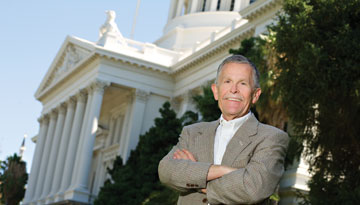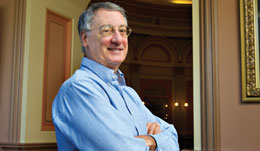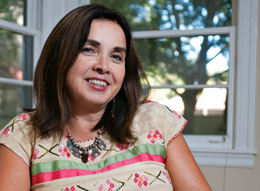Volume 29 · Number 1 · Fall 2011
Fixing our broken state
Can California remake its political system? UC Davis experts see hurdles as well as promising signs.

Political scientist Robert Huckfeldt is director of the
UC Center Sacramento, a UC Davis-based program that steeps students in public policy, state government and public affars journalism. (Karin Higgins/UC Davis)
Once the land of promise and opportunity, always a step or two ahead of the rest of the nation, California is again being tagged as ungovernable and dysfunctional, a failed state that paid its workers in scrip only two years ago and has sunk to the lowest credit rating of any state.
What has brought the world's dream factory—home to talent magnets like the Silicon Valley, Hollywood and top research universities like the University of California—to such a perilous political state?
One answer is the nation's deep recession, which has spurred high unemployment and a sagging housing market in the Golden State. But UC Davis experts say the deeper reasons are ideological gridlock, direct democracy run amok, a failure to capitalize on innovation, and political disenfranchisement.
Still, meaningful change may be near. "A number of reforms have been adopted that are aimed at fixing California's political problems," said political scientist Robert Huckfeldt, director of the UC Davis Institute of Governmental Affairs and the UC Center Sacramento.
Budgets and ballot initiatives
Huckfeldt blames some of California's dysfunction on extreme partisanship.
"Polarized political parties that are unable to negotiate and compromise create enormous problems in a democracy," said the professor, who specializes in electoral politics and political participation.
Democracy by ballot initiative—not legislature—is a tag often applied to California by scholars like Huckfeldt. Central to the budget issue is Proposition 13.
Approved by voters in 1978, this measure, in addition to capping property taxes, requires a two-thirds vote for the passage of any new state taxes in California—an insurmountable obstacle in many cases, Huckfeldt noted. Since it is rare for one party to win two thirds of the Legislature's seats, the majority party must negotiate with the minority on the budget.
Sometimes the result is an uncompromising "game of chicken" between the Democrats and Republicans on the budget, Huckfeldt said. Too often these battles drag on beyond the June 15 constitutional deadline for the Legislature to pass a budget and send it to the governor. Yet no matter how messy political squabbles may appear to the public at large, Huckfeldt said, partisanship ultimately serves a deeper purpose.
"There has never been a successful modern democracy that has survived over the long term without effective political parties," he said.
"Most of us would probably consider the 19th-century anti-slavery abolitionists to be political heroes, even though they were seen as an unreasonable and radical group by many at the time," Huckfeldt said.
In California today, there is hope for moderation, Huckfeldt believes. Through ballot initiatives, voters in 2010 approved reforms in the primary election system (Proposition 14) and legislative redistricting (Proposition 20) now going into effect.
The new primary system is intended to make the nominating process less biased in favor of the extreme partisan candidates from both parties. The top two vote-getters—whatever their party, or if they have no party at all—will face off in the general election.
Voices and citizens
Greater—not less—direct democracy is what law professor Christopher Elmendorf believes could solve California's budget woes. With a deeply divided Legislature, one alternative is to let the people vote on one of two budgets, he believes.
In a New York Times op-ed this year, Elmendorf recommended that if the Legislature and the governor fail to adopt a budget four weeks before the start of a new fiscal year, then a group of randomly selected citizens should be convened to resolve the stalemate.
"Three competing budgets would be drawn up: one by the governor, one by the Democratic caucuses in the legislative branch and one by the Republican caucuses," he said.
Over the course of two weeks, the citizens would interview government leaders, policy experts, interest groups and other supporters and critics of the rival budgets. Afterwards, the citizens would vote by secret ballot on which one to adopt.
"Our proposal," said Elmendorf, "honors Americans' insistence on a strong popular voice in government."
In a UC Davis Magazine story last year, one influential alum emphasized the critical crosswords that California is facing —on its chronic budget shortfalls and on its future. "This is a moment in history. I feel that weight," said Darrell Steinberg '84 J.D. and president pro tempore of the California State Senate.
Innovation drives California
California, even while weathering the worst recession in 60 years and with one out of eight workers out of a job, would still be the world's eighth largest economy with a gross domestic product of $1.9 trillion—larger than Russia, India or Canada—if it were its own country, according to World Bank figures for 2009.
This is a state—and arguably a state of mind—that has nurtured some of the most creative companies ever: Apple, Disney, Facebook, Google, Hewlett-Packard, Intel, Twitter, to name a few. California was also the first state to regulate greenhouse gases, allow and fund full-scale stem-cell research, and set renewable energy standards.
Steven Currall, dean of the UC Davis Graduate School of Management, believes in the power of innovation in solving California's fiscal troubles.
"The ideal way for the state to innovate its way out of the budget crisis, indeed the only way it will do so, is to focus on new private sector job creation," said Currall, who studies innovation and emerging technologies.
Cutting programs and services may partially address short-term budget challenges, he said, but the long-term solution is to create quality jobs, the kind that generate higher tax revenues, consumer spending, and housing and infrastructure investments.
"This state cannot cut itself to renewed greatness," Currall said, emphasizing the need for building society in a way that makes opportunity and upward mobility possible.
Currall said that today's best jobs are found in information technology, health care, clean energy and knowledge-intensive manufacturing.
This is where UC factors in.
"The engines of such job creation are our universities, both public and private," he said.
UC Davis and other California research universities produce an "extraordinary volume of research discoveries that can serve as the basis for start-up companies" that generate quality jobs, Currall noted.
In 2010 alone, UC research produced 1,565 new inventions—an average of four a day, the UC Office of the President reports. More than 500 startup companies have been formed with UC inventions; 75 in 2010 alone. UC Davis formed nine start-up companies in the fiscal year ending June 30, 2010.
Voting 'mixed'
In 1850, long before Apple, Google and the Internet, California became a state. Soon thereafter it became defined by a bold and brash political streak, one that favored the people over the power elite. Gov. Hiram Johnson in 1911 called a special election in which voters overwhelmingly approved three new types of balloting—referendums, recalls and initiatives. The idea was to let the people—not politicians—have the final say on important issues.
Johnson was a leader of a movement called Progressivism, which was reacting to the ills of America's industrialization by calling for populist reforms in voting, equality and justice. In California, Johnson and his followers sought to curb the powerful railroad interests then dominating the state. And they did just that.

A.G. Block is associate director of the public-affairs journalism program at the UC Center Sacramento.
The irony today is that many voters believe the initiative process has been co-opted by special interests—those with money to fund expensive campaigns—causing an explosion of ballot initiatives. In the 1970s, only 22 were voted upon; in the 1990s, 61 qualified for the ballot, and from 2000 to 2010, 74 initiatives were put to a vote.
As a result, what voters approve is decidedly "mixed," said A.G. Block, associate director of the public-affairs journalism program at the UC Center Sacramento and former editor at the nonpartisan California Journal, where he covered state government and politics for 23 years.
Block is losing faith in the ability of voters to stay informed about complex issues.
"Too often, voters seem susceptible to the loudest 'bloviator' without critically thinking about the ideas being presented or the consequences of certain actions," he said, citing Los Angeles-based radio talk shows that induced fear in lawmakers during the state's most recent budget stalemate.
Block said Sacramento's political climate today is perhaps the worst he has ever seen.
"It's difficult enough to take risks when a member understands the landscape and can predict how a particular action might play on that landscape," he said. "Caution—rather than risk-taking—seems to be the dominant factor."
Block suggests that California needs a larger Legislature. California today has the lowest ratio of legislators to residents of any state in the country, with one Assembly member for every 467,000 residents and one state senator for every 934,000 residents.
He's in favor of electing lawmakers under rules that do not promote winner-take all results, and creating regional multi-member districts with proportional voting systems, which might help elect candidates from minor parties and even independents.
"It's time to tear apart the current system," he said.
On the other hand, Block is not as enamored with the prospect of sweeping changes, the kind that could occur at a state constitutional convention if one were held. The issues are too complex, and so reform groups have adopted an incremental approach that's more politically feasible.
"They've learned that voters simply won't go for wholesale changes," he said.
Leadership and social tensions

Adela de la Torre is an agricultural economist who specializes in Latino education and health issues.
Even if the economy rebounds with the help of innovation and higher education institutions like UC, does California have the right kind of political leadership?
It all depends. Psychologist Dean Simonton studies genius, creativity and leadership qualities at the national level. He believes that "profound differences" exist between national leaders and state leaders, and that perhaps the state's problems are too much for one person—or legislature—to solve. It must be a team effort, in other words.
"The stumbling economy, the severe legal constraints on how taxes are raised and how money is spent, the term limits and three strikes laws—all courtesy of our absurd 'proposition' system—then coupled with the extreme political polarization in Sacramento, demand a miracle worker, rather than a politician," said Simonton, the author of the books Why Presidents Succeed and Greatness: Who Makes History and Why.
Simonton sees a pragmatic mindset in the office of Gov. Jerry Brown. "[He's] making hard decisions about cuts while pushing for extended taxes, and is perhaps the only realist in the capitol."
Learn more online
Hear the perspective of student Kevin Patel, who got an up-close view of the California State Assembly this past year in an internship arranged through the UC Center Sacramento, a UC Davis-run program that enables students from all undergraduate UC campuses to get experience outside the classroom.
"I have taken a lot of political science courses in Davis from great professors. I have read so many books, so many theorists … in this internship I am actually seeing things in my textbook go down in real life." Listen to more of what Patel says about the UC Center Sacramento, or visit the center's website.
No matter who's leading the state, said Adela de la Torre, professor and chair of Chicana/o studies, real change will not come until California's voter participation rates improve. Only 43 percent of eligible voters went to the polls in the November 2010 election. Such low voter turnout enables those with the money "to sell and purchase the initiative process" to dominate California.
"We have had an electorate that is historically white," she said. "Yet we have built our economic foundation on the backs of immigrants—Chinese, Japanese and Mexican immigrants. Political brokers of the past supported measures to disenfranchise and economically marginalize these important groups."
Nativist sentiment, labor strikes and vigilantism in California have tainted the state's political and social character, she explained. Today's contentious political situation is a result of this history.
While California has some of the wealthiest enclaves in the nation, she noted, it also has some of the poorest, such as the 20th Congressional District in the heart of the Central Valley that covers the city of Fresno and Kern and Kings counties. Areas like this need better education and economic opportunities.
"We must continue to invest," de la Torre said, "in creating environments that support schools, communities and families."
After all, she and other scholars point out, California's future lies in its people.
